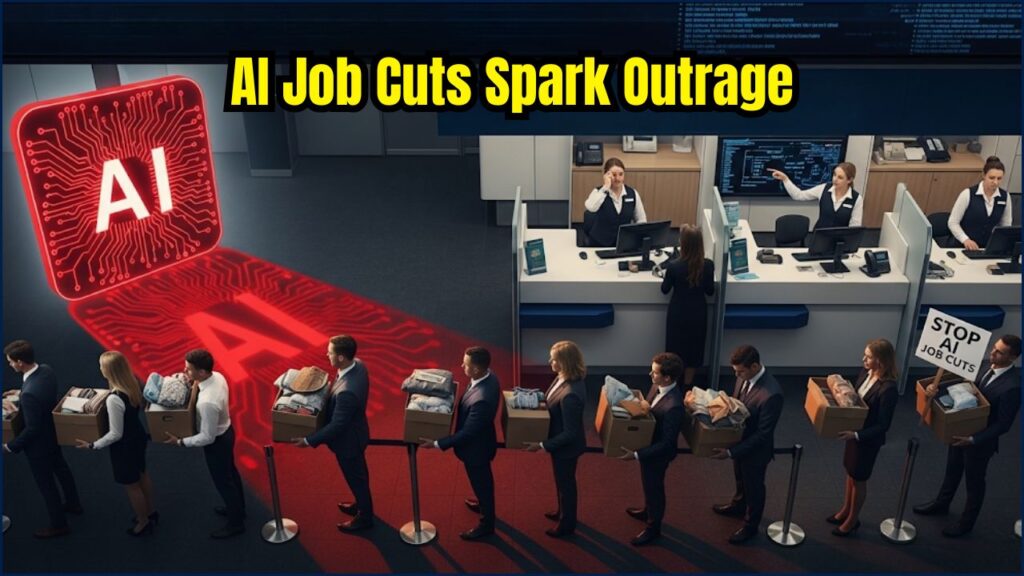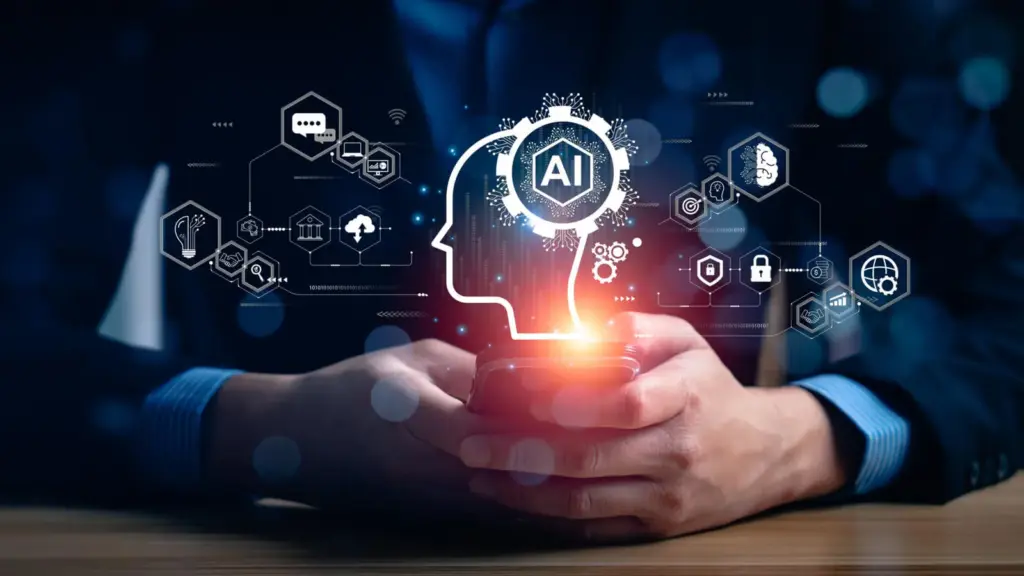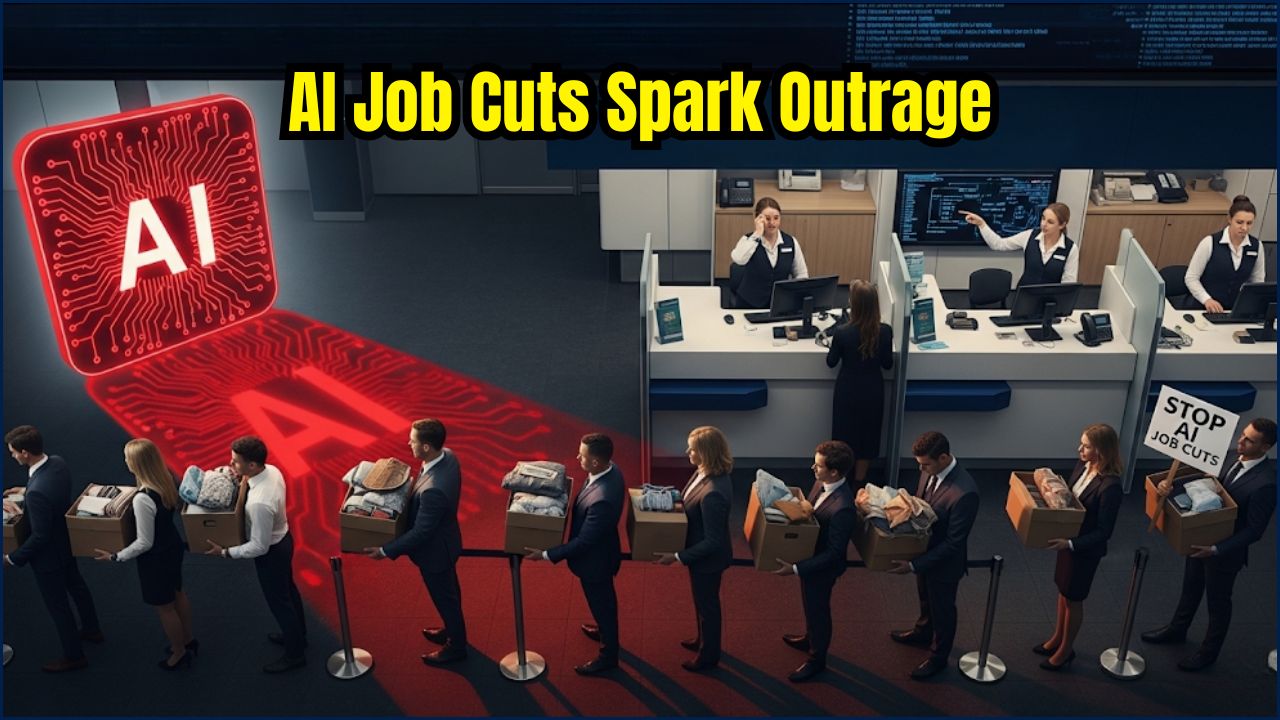Artificial Intelligence (AI) is reshaping industries, and the banking sector is no exception. In a recent move that’s making waves, Commonwealth Bank of Australia (CBA) announced the elimination of 45 customer service jobs due to its adoption of AI technology. The jobs are being replaced by an AI-driven chatbot system aimed at handling routine customer inquiries, which has raised significant concerns about the future of work.

As AI continues to evolve, the fear of job displacement grows. While AI can significantly enhance efficiency and customer service, this transition raises difficult ethical questions. Should companies like CBA prioritize technology’s efficiency over the welfare of their employees? Let’s break it down, look at the facts, and dive into what this means for the future of work.
AI Job Cuts Spark Outrage
| Key Data & Insights | Details |
|---|---|
| Job Cuts by CBA | 45 customer service positions cut in favor of AI |
| AI Implementation | AI-driven chatbot replaces routine customer inquiries |
| Union Backlash | Accusations of offshoring jobs to India, denied by CBA |
| AI Benefits | Increased efficiency, cost-cutting, improved customer service |
| CBA’s Counteraction | Offering retraining opportunities for affected workers |
| Ethical Concerns | Job displacement and the need for retraining programs |
| Industry Impact | Broad implications for other sectors adopting AI |
The adoption of AI by CBA has ignited a debate about the future of work, highlighting the need for responsible technology use. While AI can provide greater efficiency and enhance customer experience, it also presents challenges regarding job displacement, data privacy, and ethical concerns. The key to navigating this new world will be upskilling, ethical implementation, and strategic planning—ensuring that both employees and companies are prepared for the future.
AI’s Impact on the Banking Sector
AI in banking is not new, and it’s clear that its adoption is on the rise. Over the past decade, financial institutions have been integrating AI technology to enhance operations, lower costs, and provide better customer service. Some banks are already using AI to automate tasks, analyze financial data, and predict customer needs.

At CBA, the introduction of an AI-driven chatbot was expected to improve customer satisfaction by providing quicker responses to routine inquiries. The bank argued that human agents could focus on more complex customer issues, improving efficiency across the board.
However, there’s a darker side to this AI revolution. While the AI initiative promises operational efficiency, the backlash is loud and clear. The Finance Sector Union (FSU) has strongly criticized the job cuts, calling it a “job massacre” and accusing CBA of replacing Australian workers with AI. There are also allegations of jobs being offshored to India, which CBA denies.
The Controversy: AI vs. Workers
The debate around AI-driven job displacement has become a central issue in many industries, not just banking. The fear is real. AI’s ability to handle repetitive tasks more quickly and accurately means companies can achieve cost savings by reducing the number of human employees.
But here’s the question: when does automation cross the line between progress and exploitation?
Why the Backlash?
The FSU’s objections are more than just about the 45 jobs lost. They are about fairness, transparency, and the potential human cost of AI adoption. The union argues that workers should not be left behind in the race toward technological advancement. Instead, companies like CBA should be investing in training and redeployment programs to help employees transition to other roles, particularly in tech-focused areas.
Here’s an important takeaway: AI can enhance efficiency, but its implementation must be ethical and inclusive. Simply replacing workers with machines isn’t the ideal solution. There needs to be a balance between technological progress and social responsibility.
CBA’s Counterpoint
On the other hand, CBA argues that the decision to integrate AI is about improving the overall customer experience. AI chatbots handle basic queries like balance checks, routine requests, and FAQ responses—tasks that were traditionally handled by human agents. This allows the human workforce to focus on more nuanced customer issues that require empathy, creativity, or problem-solving skills.
Moreover, CBA insists that it is not cutting jobs indiscriminately. The bank is offering redeployment options, including retraining programs aimed at helping laid-off employees transition into new roles within the company. CBA even states that it continues to hire new staff in technology and digital transformation roles, particularly in India, which is often seen as a hub for tech specialists.
Real-World Example: How Other Companies Are Adapting to AI
CBA isn’t the only company implementing AI in this way. Many global giants are incorporating AI to stay competitive in an increasingly digital world. For instance, JPMorgan Chase, one of the largest banks in the United States, has leveraged AI to improve risk management and trading operations, allowing employees to focus on strategy rather than manual tasks. In healthcare, companies like Kaiser Permanente are using AI to assist with administrative tasks, leaving healthcare professionals to focus more on patient care.
These examples illustrate how AI can create efficiencies and improve job satisfaction when implemented thoughtfully. However, they also highlight the need for strategic planning to minimize job displacement.
The Global AI Revolution: What Other Countries Are Doing
It’s important to view this issue from a global perspective. Many countries are grappling with the challenges and opportunities presented by AI. For example, in the European Union, there are calls for AI regulation to ensure companies can’t replace workers without proper safeguards or retraining programs in place.
In contrast, countries like China have aggressively integrated AI into their industries without the same level of public backlash. This difference raises the question: is there a “right” way to implement AI, or should the focus be on the broader social implications?
Ethical Considerations and Data Privacy
While AI adoption offers many benefits, it also raises questions about data privacy and bias. AI systems can only perform as well as the data they are trained on. If the data used to train AI systems is biased, it could lead to unfair treatment of certain groups of people, whether in hiring, customer service, or loan approvals.
These ethical concerns must be addressed if AI is to be adopted responsibly in the workplace. Companies should be transparent about their AI strategies and involve employees in the decision-making process to ensure that the technology is used fairly.
Practical Advice for Workers and Companies
For workers, the key is to adapt. Learning new skills and staying updated on AI developments will be crucial in securing future employment. Pursuing careers in AI-related fields, such as data science, machine learning, or digital transformation, could offer job security in an AI-driven world.

For companies, the goal should be to use AI as a complement to human workers, not a replacement. Fostering a culture of upskilling and reskilling will ensure that the workforce remains adaptable, skilled, and motivated as the landscape of work changes.
FAQs
1. How can AI create new opportunities for workers?
AI can automate routine tasks, leaving employees to focus on more complex, creative, or customer-centric roles. It can also open up opportunities in AI technology, data science, and other emerging fields.
2. What is CBA doing to support displaced workers?
CBA is offering redeployment and reskilling programs to help employees transition into new roles within the bank, including in technology and digital transformation.
3. Is AI replacing all customer service jobs?
Not entirely. While AI can handle repetitive tasks, human agents are still required for more complex or emotionally sensitive customer interactions.
4. What are the ethical concerns with AI?
AI systems can be biased or violate data privacy, leading to unfair treatment. Companies must ensure that AI is implemented ethically, with transparent practices and safeguards in place.
5. How can I prepare for a future with more AI?
Upskilling in tech-related areas like AI, data science, and machine learning can open up new career paths. Being flexible and adaptable to change is key to thriving in an AI-driven world.












